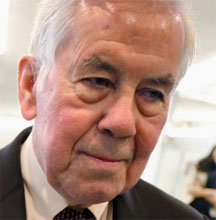A US congressional proposal aimed at expelling Argentina’s populist-leftist government from the G-20 group of the world’s leading economies faces an uncertain future, not the least because it lacks significant support from unexpected quarters — conservative Cuban-American Republican lawmakers.

The proposed resolution refers to Argentina’s recent expropriation of YPF, which was owned by Spain’s Repsol oil firm, as well as to Argentina’s failure to honour more than 100 US court rulings ordering it to fulfil obligations with US creditors, and to Argentina’s failure to comply with World Bank international settlement disputes. Argentina accounts for 78 per cent of all disputes that are currently before the World Bank’s settlement court, it says.

“As a nation that mocks the law and declines to respect the property and interests of foreign investors, Argentina should not have a world leadership role in the G-20,” Lugar said.
Carl Meacham, a top Lugar aide, told me that the motion is likely to be voted on in June. While “sense of the Congress” resolutions are not mandatory, this one would put pressure on the Obama administration to comply with it because it takes place in an election year, in which Obama would not want to be accused of being “soft” on foreign policy issues.
“There is a lot of support for it,” Meacham said. “For the sake of preserving the integrity of the international economic system, you cannot allow countries to get away with murder and send a message that there are no consequences to deal with transgressions.”
Other congressional sources are less convinced that Lugar’s proposal will fly. Lugar’s recent defeat by a Tea Party-supported candidate in the Indiana Republican primary makes him a lame-duck senator, which takes away some of his clout.
But he remains one of the most widely respected senators, and many legislators could support his upcoming initiatives as a tribute to his more than 35 years in Congress.
In addition, key Republican Cuban-American legislators are hesitant about coming across as supporting Repsol’s claims against Argentina, because of Repsol’s presence in Cuba.
Sen Marco Rubio, R-Fla, a fellow member of the Senate Foreign Relations Committee and one of the leading candidates for the Republican vice-presidential nomination, told me in an e-mail that “I agree with the goals of the resolution,“ but stopped short of saying he will co-sponsor it, or vote for it.

House Foreign Relations Committee Chairwoman Ileana Ross Lehtinen told me that “while I do not condone the Argentine government’s actions against Repsol, this Spanish company has a track record of putting its profits before human rights and liberty. Repsol opens itself up to many uncertainties by partnering with despots such as the Castro brothers.”
Asked for a reaction to Lugar’s G-20 suspension proposal, Argentina’s ambassador to the United States Jorge Arguello said that the country was “not worried because it’s clear that this proposal distorts the facts and contains baseless accusations.”
Arguello argued that Argentina has “rigorously followed all legal procedures,“ in the YPF expropriation under an Argentina-Spain investment agreement that expressly allows such takeovers.
Regarding Lugar’s charges that Argentina is not honoring more than 100 US court rulings from investors hurt by Argentina’s 2001 default on its foreign debt, Arguello countered that his government is “religiously paying“ the country’s debts to 93 per cent of its creditors. The remaining 7 per cent will not be paid until they drop their demands to get preferential treatment, he said.
My opinion: There is little love for Argentina’s cult of transgression within the US and European Union governments. But I doubt that the United States and Europe will do more than give Argentine President Cristina Fernández de Kirchner an icy welcome at the G-20 summit next month in Mexico, or put out a statement tacitly condemning Argentina.
Barring outside factors such as a Greek default that would shake world markets and draw calls for stronger actions against “transgressor” countries, G-20 leaders will look at the YPF affair as a bilateral problem between Spain and a country they see as Latin America’s bipolar teenager. If Greece follows Argentina’s steps, however, it may be another story.
© The Miami Herald, 2012. Distributed by Knight Ridder/Tribune Media Services.





